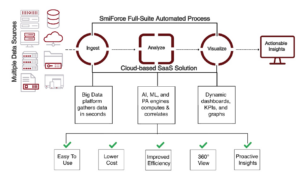In digital infrastructure, two prominent players dominate the landscape: hyperscale vs. colocation. As your business grapples with evolving data demands, you need to understand the key differences between these two solutions to optimize your investments in infrastructure.
The good news? Many businesses just like yours are weighing their options when it comes to hyperscale and colocation: Industry revenue for colocation is expected to rise into 2028, with a projected valuation of $136 billion.
“Deciding between colocation and hyperscale data centers depends on what your business needs,” said John Unger, President of Vaultas.
“Colocation is suited for businesses looking for flexible, cost-effective solutions for changing requirements. Hyperscale is ideal for large enterprises with high data volume needs, offering scalable and powerful data processing. Knowing their differences is essential for making the best choice for your company’s digital infrastructure.”
In this blog, we’ll cover colocation and its types, hyperscale, and differences between the two at a glance, as well as in-depth. We’ll also provide guidance on what to consider when you’re choosing between hyperscale vs. colocation data centers.
First, What is Colocation?
Colocation data centers provide a unique solution for businesses ready to evolve past legacy private data centers.
These facilities allow for quick scalability of networking, compute, data storage and security systems both physical and virtual using an as-a-service model, which is especially beneficial for companies needing more capacity on short notice or simply using a OpEx model vs a CapEx model for your business. The ability to do both is what is best for your organization.
One of the key advantages of colocation is connectivity. Businesses housed in a carrier-neutral facility can easily connect to any vendor solution or end user/customer facilitating a dynamic digital ecosystem custom to your business. This setup unlocks new services and capabilities, vastly improving operational efficiency, innovation and growth.
It also offers more control at a lower cost compared to private data centers or cloud-only models. In this model, businesses can design and build their own space, but it requires a commitment to leasing larger spaces and power units. This approach is favored by large corporations and cloud service providers.
The Advantages of Colocation
The primary advantage of colocation lies in its ability to ensure consistent availability, which is critical for businesses aiming to maintain uninterrupted operations and high system reliability.
Colocation facilities enable edge computing, which significantly reduces latency, leading to faster response times and enhanced user experience.
Furthermore, colocation makes it easier for companies to expand into new markets. By leveraging the infrastructure of colocation centers, businesses can quickly establish a presence in new areas without the need for substantial upfront investment in physical infrastructure.
Another critical aspect of colocation is its adherence to security and compliance requirements. These facilities are equipped and monitored 24x7x365 to maintain the highest levels of security, ensuring that sensitive equipment and data is protected.
This compliance of operating under regulatory standards is vital for businesses that handle critical data and require compliance and robust security measures.
Never Be Restricted by IT Scalability
Second, What is a Hyperscale Data Center?
Hyperscale data centers (HDCs) represent the pinnacle of data storage and processing capabilities, operating on a massive scale to meet the ever-growing demands of larger organizations and companies. HDCs also employ virtualization, allowing servers to run multiple virtual servers simultaneously.
We offer access to these hyperscale centers without the need to pay the price to actually be inside them. We also provide direct access to these hyperscaler centers via our many networking partners.
The design of HDCs focuses on homogeneous scaling and immense processing power, catering to the needs of companies like Target, Kohls, and other cloud providers like Datto and Nutanix.
Due to the high build-out cost of the facilities. HDCs are often exclusive to these large corporations, although some may also offer services to third parties and partners like Vaultas enabling SMB businesses access to these HDCs.
HDCs revolve around equipment and tools specialized for large-scale data processing, and their server architecture is composed of thousands of servers in a distributed computing setup. These servers are organized into clusters, with each cluster handling specific workloads.
Load-balancing algorithms are used to ensure even workload distribution across servers. These centers are used for primary application and system providers, needing predictable and scalable Networking and IT systems at a moment’s notice.
Networking technologies play a crucial role, including software-defined networking and network function virtualization. Vaultas’s carrier-neutral model promotes cost-effective networking by providing access to any network provider of choice.
Colocation vs. Hyperscale: The Differences at a Glance
|
Differences Between Hyperscale Data Centers and Colocation – In Depth
Hyperscale and colocation data centers serve vastly different needs due to their size to tenant structure.
Size-wise, hyperscale data centers are enormous. They house millions of servers and are designed for huge data-intensive businesses like tech giants. Have huge CapEx models that go with them. In contrast, colocation data centers have an overall smaller footprint, catering to a range of businesses with a range of IT needs.
When it comes to management, hyperscale data centers are exclusively managed by the owner’s employees. Colocation centers offer varied management options, depending on the customer’s choice, which can range from fully managed services to more hands-off approaches.
Ownership is another key difference. Hyperscale data centers are typically owned and operated by tech giants like Google and Amazon. Colocation centers, however, are owned by third-party providers offering both wholesale and retail services to a variety of clients.
In terms of pricing, hyperscale data centers may appear less costly in the short term but require a long-term commitment, which might not be feasible for all businesses.
You should know that while colocation centers are more expensive than hyperscale due to their flexible leasing options, they are generally much less costly than on-premises data solutions. Additionally, colocation provides greater flexibility and scalability, making it a cost-effective and adaptable choice for many businesses.
Finally, hyperscale data centers usually have a single tenant – the owner – and are exclusively used for their operations.
In contrast, colocation data centers typically house multiple tenants from diverse industries, creating a communal and resource-sharing environment. However, it’s important to note that there are colocation facilities that offer private suites and private connections, allowing for dedicated space and bandwidth without the need to share resources.
Learn more about data management and scalability with our blog: |
What to Consider When Choosing Between Data Center Colocation vs Hyperscale
For small- to medium-sized businesses, colocation is typically more suitable. You’re able to lease exactly what you need in terms of space and resources without the substantial investment required for a hyperscale setup. Both hyperscale and colocation services, however, offer access to cloud computing.
Large enterprises might lean towards wholesale colocation for more extensive needs, or even consider building their own hyperscale data center if their operations demand it.
Internet connectivity in colocation facilities is a major plus. These facilities offer high-speed connections and cloud on-ramps so you can connect to hyperscalers like AWS. While some may not offer the ISP flexibility found in hyperscale centers, colocation connectivity provided is robust and dependable.
Note: Off-net facilities, such as Vaultas, are carrier-neutral centers that provide immense ISP flexibility as well as cloud on-ramp access.
Colocation centers also provide access to professional staff, ensuring your IT infrastructure is monitored and managed by experts. This is especially useful if your IT team is geographically separated from the colocation facility.
Finally, the cost aspect of colocation is particularly of note for businesses with small tech teams and moderate data needs. Colocation provides a cost-effective way to access high-quality data center facilities without the hefty investment required to build their own or for hyperscale setups.
Unlock Your Business Potential with Expert Colocation Services
With 40+ years of expertise, Vaultas is your go-to for a vast network of data centers, networks, and colocation services. Always on with 24x7x365 support, our colocation network consists of over 60 providers across 1,600+ locations globally.
Want access to over 500 network providers and IT solution suppliers? We’ve got them. Our mission is simple: tailor-made tech solutions that fit your business perfectly.
It’s time to discover the Vaultas edge. Empower your business journey today with our expansive tech ecosystem and expert knowledge and advice.
Get in touch today – let’s drive your business forward.






